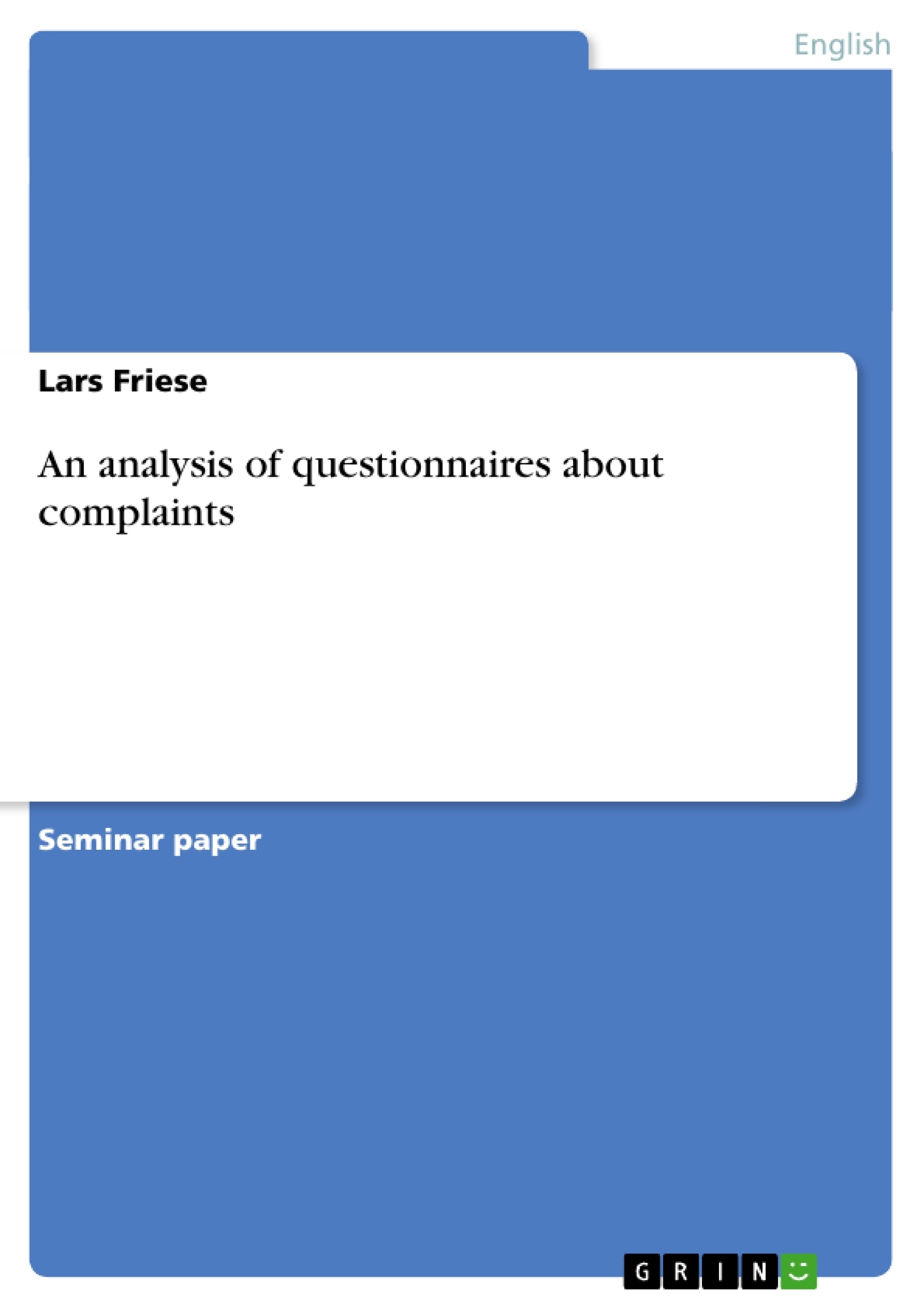What would you say if your best friend destroys your camera he has borrowed from you? And how do you react if you wait a long time for your meal in a restaurant, and when it is finally served, it is cold? How would another person react? This paper tries to investigate and analyze complaints in such everyday situations. Therefore, our group in the seminar Cross-Cultural Pragmatics (summer semester 2002) at the English department of the University of Münster constructed a discourse completion test about complaints and distributed it to several volunteers. Based on current linguistic theory, I will now evaluate the data with respect to self-formulated hypotheses. First, I will deal with theoretical background information on complaints which is mostly based on Olshtain’s and Weinbach’s research (Olshtain and Weinbach 1993). This chapter introduces a linguistic definition of “complaints” and some basic facts about the concept of ‘face’ and so-called face-threatening acts. In addition to this, preconditions for complaints, “payoff” considerations and different categories of complaints will be presented and analyzed. Then, in chapter 3, I will put forward 3 working hypotheses which will establish the focus of the following analysis. Furthermore, in chapter 4, the construction of our questionnaire is explained in detail as well as different social variables that are essential for the study. In the main part, chapter 5, the collected data are presented and analyzed. Moreover, not only difficulties in evaluating the data are reflected here, but also an evaluation of my 3 hypotheses. The conclusion in chapter 6 summarizes the findings and presents perspectives as well as limitations of the study. Chapter 7 is the bibliography, and the appendix (chapter 8) contains both the English and the German version of the questionnaire and tables of the data which is the basis for my diagrams.
Inhaltsverzeichnis (Table of Contents)
- Introduction
- Theoretical Background
- Definition of “complaints”
- Face-threatening acts
- Preconditions for complaints
- Payoff considerations
- Five categories of complaining
- Hypotheses
- Methodology
- Data Collected
- Problems of Categorization
- Results & Discussion
- Evaluation of the Hypotheses
- Conclusion
- Summary
- Limitations and Perspectives
- Bibliography
- Appendix
Zielsetzung und Themenschwerpunkte (Objectives and Key Themes)
This paper aims to investigate and analyze complaints in everyday situations by examining data collected from a discourse completion test created by the author and distributed to several volunteers. The analysis focuses on applying current linguistic theory, specifically drawing upon Olshtain and Weinbach's research on complaints.
- Defining the speech act of "complaining" and its linguistic characteristics
- Examining the concept of "face" and how complaints threaten the hearer's positive face
- Exploring preconditions for complaints and the factors that influence a speaker's decision to complain
- Analyzing different categories of complaining based on the degree of face-threat involved
- Evaluating hypotheses related to complaint behavior using data from the discourse completion test
Zusammenfassung der Kapitel (Chapter Summaries)
The first chapter introduces the research question and provides a general overview of the study. Chapter 2 presents a theoretical background on complaints, defining the speech act and exploring the concept of face-threatening acts. The chapter further explores preconditions for complaints, the decision-making process involved in choosing to complain, and different categories of complaints based on their face-threatening potential.
Chapter 3 lays out the hypotheses that will be tested throughout the analysis. Chapter 4 details the methodology, including the construction of the questionnaire and the social variables considered in the study. Chapter 5 presents and analyzes the collected data, highlighting challenges in interpretation and evaluating the hypotheses.
Schlüsselwörter (Keywords)
This paper explores the speech act of complaining, face-threatening acts, preconditions for complaints, "payoff" considerations, and different categories of complaining. The analysis draws heavily upon Olshtain and Weinbach's research (1993), focusing on the intersection of language and social interaction in everyday situations.
Frequently Asked Questions
What is the focus of this linguistic analysis on complaints?
The paper investigates how people complain in everyday situations, using a discourse completion test to collect data and applying theories from cross-cultural pragmatics.
What are "face-threatening acts" in the context of complaining?
Complaints are considered face-threatening acts because they challenge the hearer's positive face (the desire to be liked/approved) by pointing out a perceived wrong or failure.
Whose research is the theoretical background based on?
The theoretical framework is primarily based on the research of Olshtain and Weinbach (1993) regarding speech acts and social interaction.
What are "payoff" considerations in complaints?
Payoff considerations refer to the internal decision-making process where a speaker weighs the potential benefits of complaining against the social risks or effort involved.
What methodology was used to collect the data?
The study used a discourse completion test (questionnaire) distributed to several volunteers, featuring situational prompts like a friend breaking a camera or cold food in a restaurant.
- Quote paper
- Studienreferendar Lars Friese (Author), 2004, An analysis of questionnaires about complaints, Munich, GRIN Verlag, https://www.hausarbeiten.de/document/37667


